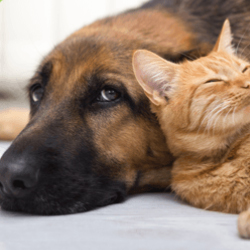
Although we love our pets, there’s no denying the expense that comes with owning one. From feeding and pet accessories to paying for kennels and catteries, caring for our beloved pets comes at a price. However, the biggest hit on our finances is likely to be an emergency vet bill. None of us want to imagine our pets falling ill or getting injured, however, it sometimes pays to be prepared for such eventualities.
In short, pet insurance is designed to cover the majority of the costs incurred for treatment an animal needs to have during an illness or following an injury. The market for pet insurance has increased in recent years due to owners having higher expectations for pet healthcare.
As with other policy types, the terms of pet insurance can be tailored and tweaked to suit the individual- and the pet in question of course. These choices seem overwhelming at the time, but are important to get right so you aren’t caught out by your policy falling short of your needs.
Whether you’ve got multiple cats and dogs running around or a field of frolicking horses, understanding the ins and outs of pet insurance is crucial to picking the right policy for you. Below, we skim the surface of what needs to be looked at, but will cover the policies on offer, briefly what they entail and some crucial tips for selecting your policy.
Policies covering treatment at your local vets
When it comes to insuring your pet, it’s important to note that there are four main policy types offered by most insurance providers but each of these policies will have levels of cover to chose:
Lifetime policy
This policy will cover your pets entire life time, assuming you stay with the same insurer. It will cover the fees for any chronic or recurring illnesses as well as injuries during their lifetime. A pet will be covered up to a set amount each year and if the limit is reached during the policy year, you will not be able to claim for any further treatment until the following policy year.
However, any medical issues or accidents that took place prior to taking out the policy will usually not be covered, so taking the policy out as early in your pets life as possible is recommended. The policy needs to be renewed each year to remain active and may have certain clauses such as; annual health checks and vaccinations to be keep up to date.
These types of policy will be more expensive in general but do provide the most comprehensive range of cover options.
Per condition policy
As suggested by the name, this policy works on a ‘per condition’ basis. A fixed amount of money is provided for each ailment or injury and once this is spent, the animal will no longer be covered. The policy has to be renewed at the end of each policy period (usually a year) and payments must be made on time. Previously existing conditions are unlikely to be covered and exclusions will be in place. These policies need to be selected carefully to make sure the cover is adequate for your needs and circumstance.
Time-limited policy
The owner is given a fixed sum to cover treatment for illness and injury and a time period (usually 12 months). This is usually for short term illnesses or minor accidents and although the policy will not run out after the specified time period, the specific illness/injury will no longer be covered after this time. These policies may appear very cost effective but can quickly lead to multiple exclusions over the life time of your pet and may exclude issues that have been previously mentioned in any veterinary clinical notes, even if they weren’t claimed for at the time.
Accident-only policy
These policies provide a fixed sum for any accidental injuries that may occur and may also include an amount towards the cost of emergency treatments for illness. The policy usually lasts for 12 months and must be renewed to remain active. These polices tend to be very basic and are more designed to provide enough cover to get you to an emergency vet but may fall well short of in depth investigations, major procedures or referrals.
Whilst every insurance provider’s terms will differ, there are certain vet fees that are not usually covered by pet insurance. Some of these include:
- Vaccinations
- Routine check-ups and procedures such as claw clipping and worm treatment
- Spaying and neutering
- Microchipping
- Routine dental treatment
- Breeding/pregnancy complications
However, some things that ARE commonly covered but lesser known include:
- Kennel or cattery fees that need to be paid if you yourself have been hospitalised
- Holiday cancellations after a pet has fallen ill
- Advertising costs for a lost/stolen pet
- Medical treatment fees for your pet whilst you are abroad
- Third party cover if your dog causes an accident or injury to another dog (exclusions will apply)
Insurance cover for emergency vet visits
In the event of an emergency, it’s comforting to know that professional help is only a phone call away. Vets providing their own out of hours cover and emergency animal hospitals have to provide staff around the clock to ensure that medical advice and care is on hand when needed. However, keeping a business staffed 24 hours a day, 7 days a week is a costly venture and as a result, out-of-hours vet fees are often more expensive than daytime rates.
As well as the out of hours fees associated with initial consultation, you will also be charged for any treatment required. Medical and surgical procedures may also incur a premium out of hours, alongside other costs. In the rare circumstance pet is not fit to travel, you may require a vet to make a house call which is likely to be even more costly. It goes without saying that costs can escalate quickly and with this in mind, it may be an idea to select a policy that incorporates emergency vet fees.
The small print covering emergency fees needs to be check thoroughly as it may limit fees or certain types of claim that you may assume would be covered, especially in many of the lower end policies.
As previously mentioned, some accident-only policies may cover emergency treatment needed for certain illnesses. However, if you would like to be fully insured for unforeseen circumstances, it’s important to ensure that your agreement mentions this explicitly.
In the section entitled ‘significant exclusions and limitations’ or ‘what will not be covered’, check carefully for any mention of out-of-hours medical care as if this is stipulated as not being provided, your pet will not be covered.
Unfortunately, accidents can happen when we least expect them and certain illnesses need to be tended to as a matter of urgency. Although an insurance agreement that covers 24 hour vet services might be a little more expensive, it may prove life changing for both you and your pet and could save you a lot of money in the long-term.
At Minster Veterinary Centre, we have the expertise and knowledge needed to offer veterinary care to pets and livestock 24 hours a day, 7 days a week.
Last minute tips
When making decisions on which policy to choose, your choices will be dependent upon many factors such as your own personal circumstance, affordability, your animal’s medical history and perhaps your own lifestyle.
However, make sure you understand the policy you’re taking out, read the small print carefully to ensure everything you expect is included and understand, just getting the cheapest price doesn’t guarantee you’re getting a good deal.
Finally, please be aware that vets will not know the ins and outs of your policy, they will purely make recommendations based on the best advice they can give. You are responsible for the exclusions and limitations of your policy and any short falls in cost this may leave you to cover.



